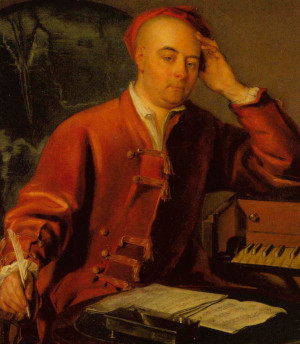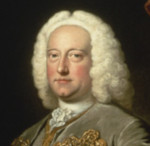© 19 Colin Melbourne
Read Part 1

George Friderick Handel composing with his portable clavichord.
Despised and Rejected of Men
G.F. Handel hit hard times in mid-life. His latest operas had flopped. He was made bankrupt, and under threat of debtor’s prison.
His godly Christian Patron asked The LORD what he should do to help his dejected friend.
The LORD led him, not to pay his debts, but instead to give the despairing Composer His written word, and see what Handel would make of it.
The LORD is still multiplying that same loaf and feeding multitudes: And you are one of them.

Charles Jennens
Charles Jennens (1700-1773)
Wealthy English landowner, Charles Jennens, was barred from public office as a Nonjuror, because he refused the Oath of Allegiance to the ruling Protestant Monarchy, and supported the defunct Stuart royal-line.
The LORD Jesus Christ prohibits believers from making oaths and swearing allegiance, Mtt. 5:33-37 KJV;
Again, ye have heard that it hath been said by them of old time, Thou shalt not forswear thyself, but shalt perform unto the Lord thine oaths: But I say unto you, Swear not at all; neither by heaven; for it is God’s throne: Nor by the earth; for it is his footstool: neither by Jerusalem; for it is the city of the great King.
Neither shalt thou swear by thy head, because thou canst not make one hair white or black.
But let your communication be, Yea, yea; Nay, nay: for whatsoever is more than these cometh of evil.
Jennens was of course right to obey Christ by refusing to swear an oath, the taking of oaths is expressly forbidden to Christians, though Jennens’ support of the Catholic Stuarts was a serious error of judgment, because Catholics are Not Christian
Christian Patron
The outcome was that unmarried Jennens devoted his time, and considerable wealth, to sponsoring deserving arts, notably befriending, and supporting G. F. Handel.
A serious student of the Bible, Charles Jennens had a much firmer grasp of Gospel basics than his musical companion.
Handel had spent time in his youth in decadent Italy, and was already a celebrity when he wisely decided to settle in London in his late twenties.
Jennens, was understandably perturbed by Handel’s nominal Christian faith, and suspected the Composer was influenced by continental ‘Enlightenment thinking’, veering to Deism, and away from the truth.
Charles was also aware the Composer was in dire financial straits; crushed under a mound of ‘promissary notes’, on the verge of official bankruptcy, and debtor’s prison.
His recent London staged operas having failed to excite theatre-goers.
Lord, What Do You Want Me to do?
The LORD gave Jennens an idea as he prayed for his friend.
Using his deep biblical knowledge, and gift for writing, Jennens compiled a biblical libretto with an emphatic Gospel declaration, and shrewdly invited Handel to set it to music in the unusual style of a Baroque Sacred Oratorio: Messiah.
G.F. H. was living ‘closer to the bone’ than his wealthy friend, so naturally inclined to compose in the popular flamboyant operatic style for the lucrative Italian, French, or Prussian audiences. But nevertheless, was persuaded to indulge his English Patron by composing in the more appropriate, less theatrical, oratorio format. (But even this provoked controversy from the Establishment.)
Faith Cometh by Hearing
The cash-strapped composer obliged, and studying the words of the new libretto inspired him to focus, crystallise, and deepen, his own trust in the Person of the LORD Jesus Christ, and His finished Sacrifice.
Handel was raised a Lutheran church-goer, attended services, and prayed corporately with gusto. But none of that makes a Christian, as Christ Himself emphasised to a church-going Jewish prayer leader named Nicodemus.
He asked God-in-The-Flesh how to know God, and get to Heaven, Jn. 3:3-7 KJV;
Jesus answered and said unto him, Verily, verily, I say unto thee, Except a man be born again, he cannot see the kingdom of God.
Nicodemus saith unto him, How can a man be born when he is old? can he enter the second time into his mother’s womb, and be born?
Jesus answered, Verily, verily, I say unto thee, Except a man be born of water and of the Spirit, he cannot enter into the kingdom of God. That which is born of the flesh is flesh; and that which is born of the Spirit is spirit. Marvel not that I said unto thee, Ye must be born again.
Nominal ‘Christians’ in Hell
Millions of devout, church-going, praying sinners, will be found in Hell, from all denominations and cults, because Jesus said, Ye must be born again.
Oh Halleluia! What a joy it is to be born into the Kingdom of God, and know it on the inside!
Have you been born of God?
Can you see the Kingdom of God?
If not, you will be born again when you do two simple things.
Inspired and Anointed
Remarkably, Handel composed the complete three hour oratorio in only twenty-four days; not leaving his Brook Street home, eating little, writing in a state of spiritual bliss at his clavichord from morning to night time.
His faithful servant tried to coax him to eat, entering his room with a tray of food, he found Handel sobbing, with tears streaming down his face, the inspired Composer declared that he’d just seen into Heaven itself.
Such was the anointing upon him.
The music he was writing at the time was the Halleluia chorus.
Praise God we know exactly what Handel meant, don’t we?
Not In Our Church!
It surprises Christians today to learn that the fiercest opposition to staging Handel’s Messiah came from the Church of England (Anglican, aka. Episcopal in North America).
This antagonism would have been part of the reason Handel chose to stage the premiere across the Irish Sea in Dublin, where he’d also recently been commissioned to compose for a charitable event, to raise funds for a debtor’s prison.
We wonder who arranged that timely ‘coincidence’. Doubtless the LORD nudged Jennens in his prayer closet again.
The LORD responded by prompting William Cavendish, Duke of Devonshire, to answer a request from Dublin Anglicans, confirming he would sponsor a fund-raising event to release debtors from prison.

Anglican, Jonathan Swift
To preempt objections it was entitled “A Sacred Oratorio”, but even then the Dean of St Patrick’s Cathedral, Dublin (The Jonathan Swift) initially forbade its singers from participating in the production at the Music Hall in Fishamble street.
Anglicans protested strongly to Handel bringing shame on the subject. They thought it demeaned The LORD to perform in a music hall, employing secular singers. Some commented that it was blasphemous to utter sacred texts in such a setting, where lewd sinful entertainments abound.
Even up to the mid-eighteenth century the Bishop of London forbade the performance of Messiah in Westminster Abbey.

Anglican, John Newton
Notably, Anglican cleric, John Newton, author of the hymn Amazing Grace, preached for over a year against what he called ‘secular’ performances of the biblical oratorio. Handel remained gracious, knowing better than to respond to such criticism.
The Penny Had Dropped
By the time of the 13th. April 1742 Dublin premiere of Messiah, Handel had become clear, and very emphatic, about the evangelistic purpose of his masterpiece.
The charitable motivation of the event led to 142 prisoner’s debts being paid in full, and they were released from debtor’s prison. Handel’s own life arose from his personal nadir of despair.
The following Easter it was performed in London for the first time.
When complimented, on the glorious success of the performance by Lord Kinnoul, who congratulated Handel on the excellent ‘entertainment’, the Composer responded, according to “The Spiritual Lives of the Great Composers” by Patrick Kavanaugh;
‘My Lord, I should be sorry if I only entertain them. I wish to make them better’.
All We Like Sheep
I invite you to listen again to Handel’s Messiah, attending closely to the Living Word, and The Messiah will reveal Himself to you.
© 19 Colin Melbourne
You may also like to read;

